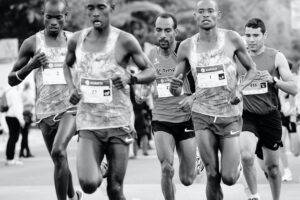Thomas Edison (1847-1931) was an American inventor and businessman. His achievements have helped to lay the foundations of today's modern industrialised world. He was also the first man to have an industrial research laboratory.
After your genius idea, you have to be motivated to realise it. Motivation is driven by autonomy, competence and meaning. When these three elements are fulfilled, you are intrinsically motivated. And to stay motivated, it’s important to take small steps in the right direction every day.
Thomas Edison makes it clear that just having a genius idea is not enough to achieve your goal. You have to work for it.
The Romans believed in the existence of the ‘genius’, an invisible guardian spirit or angel who assisted every human being from birth to death. Every idea, inspiration or insight was the work of your guardian spirit.
In 2017/2018, you could watch the mini-series Genius on the National Geographic channel. The first season was dedicated to Albert Einstein and the second to Pablo Picasso. In this series, Albert Einstein developed the theory of relativity in 15 minutes. And Pablo Picasso’s masterpieces were created in seconds.
Of course, we know better. Creating is a difficult and painful process. Writers wallow in a kind of martyrdom and enjoy expressions such as ‘writing is deleting’, ‘a white sheet of paper’ or ‘writer's block’.
There is a well-known anecdote about James Joyce who was once asked how many words he had written in a day. “Seven”, was his desperate reply, “…and I don't know in what order”. His masterpiece Ulysses totals around 265,000 words... The story goes that Pablo Picasso, one warm summer’s evening, sat on a restaurant terrace scribbling on a paper napkin. The scribbles were insignificant, but very recognisably Picasso’s hand. A woman asked him if she could have the napkin. “Certainly”, Picasso replied, “that will be $10,000.” The woman reacted with shock: "$10,000? But you only worked on it for 30 seconds!” To which Picasso replied, “You are mistaken, madam. This has cost me 40 years of my life.”
As a mere mortal on this earth, I have never quite understood what to make of Thomas Edison’s statement “Genius is one percent inspiration and ninety-nine percent perspiration”. Is Edison (1847-1931), who we would today class as a serial entrepreneur, encouraging us to be more self-disciplined and hard-working or is it an attempt to reassure us that you don’t have to be a whizz kid with an IQ of 150 to achieve something genius? In any case, he makes it clear that just having a genius idea is not enough to achieve your goal. You have to work for it.
Thomas Edison took ‘work’ very literally. After being home-schooled by his mother until 12 years of age, he went to work as a newspaper boy on trains. To fill his downtime, he read chemistry books and then set up a railway carriage as a laboratory. After saving the life of the stationmaster’s son, he was promoted to telegrapher. He immediately began to improve the telegraphic apparatus and, with the profits from those improvements, founded a workshop for innovations, which later became the world’s first research laboratory. The consequences are well-known – 1400 patents – including the light bulb and the phonograph – and the creation of the General Electric Company which still employed more than 200,000 people in 2020.

Thomas Edison was not so much an inventor as an innovator. Take the light bulb. Edison didn’t invent the light bulb, he improved it. There were numerous other brilliant scientists who had previously developed incandescent lamps as alternative lighting for candles and oil lamps. But Edison systematically improved it. His first incandescent lamp with carbon fibre in a vacuum burned for only a few hours and, after great effort, he had a lamp that could burn for up to 1200 hours. Coincidence or not, but today we often use the pictogram of a light bulb for innovation... Is this an ongoing tribute to Edison?
The Romans believed in the existence of the ‘genius’, an invisible guardian spirit or angel who assisted every human being from birth to death. Every idea, inspiration or insight was the work of your guardian spirit. The noun ‘genius’ comes from the Latin verbs ‘gignere’ and ‘generare’ – to bring forth, to beget. As a mortal, you couldn’t choose your genius. But the Romans did notice that some people – say Virgil, Ovid or Marcus Aurelius – had very active and powerful genii. Soon, the word ‘genius’ began to mean ‘talent’ and ‘inspiration’. Your guardian spirit gave you inspiration and ideas (one percent of the work) and you, ordinary mortal, with your head and your hands, put them into practice (99% of the work). Strong together!
So it's all about starting once the idea’s borne – the spark. Or as the American director Woody Allen put it, “Eighty percent of success is showing up”. And so you must have sufficient motivation to start.
Many are convinced that, as Dan Pinker, among others, describes in Drive, motivation is driven by three elements – autonomy (our desire to be self-directing), competence (you like doing what you’re skilled at and you want to take your skills to the next level) and meaning (the desire to do something meaningful). When these three elements are fulfilled, you are intrinsically motivated – you perform the activity because it gives you inner satisfaction. This is in contrast to extrinsic motivation – you do the task because it rewards you later. Just think of your student job as a kitchen helper at McDonald's.

It’s amazing how cunningly games capitalise on these three elements. I – from the days of Packman and Tetris – often watch in amazement how my 15-year-old son can spend hours playing Minecraft. That is until one evening when he explained the game to me. Minecraft is an open world game by Mojang Studios and the world's most popular video game with 120 million monthly active players. As a player, you can walk freely around a virtual world with no pre-determined goal (autonomy). You can mine land and use it to produce objects and buildings that you need to protect you from monsters. Once you have determined your objective, everything takes on a meaning (sense). For example, if you want to build a hut, you first have to collect the necessary raw materials. And finally, there are plenty of opportunities to practise (develop skills). There’s also a separate mode where you can learn how to assemble objects or buildings without danger. You can explore the world on your own, play with friends or spend days watching Minecraft tutorials on YouTube. My son was very proud when he figured out how to make rectangular blocks into circular buildings. He was ready for the next challenge!

People sweat everywhere during physical exertion or, during certain emotions (stress, lying, etc.), in specific places (forehead, armpits, palms of hands and soles of feet). The merocrine glands then secrete salt water, the sweat evaporates, cooling the skin, lowering the internal body temperature. This allows the body to continue its efforts. But when do we know that the ‘sweat of our eye’ also makes us a living? Is our toil limited to carrying water to the sea, sending owls to Athens or, like Sysiphos, pushing a boulder up a steep mountain again and again?
In other words, how do we measure the results of our labour and can we conclude that our labour will lead to the desired result?
American Harvard professor Teresa M. Amabile, in her study The Progress Principle, underlines the importance of “the power of small wins”. For her study, she examined diaries of 238 employees from 26 project teams, representing 12,000 diary entries. Based on these daily stories, she found that, in addition to the importance of intrinsic motivation and a positive work environment, it’s important to take a small step in the right direction every day. And this small step can literally be anything – a bug that’s finally fixed, a presentation to an internal working group that went well or a customer who shares some important insights with you... (Watch Amabile at work in a Tedx Talk here). She writes: “Because inner work life has such a potent effect on creativity and productivity, and because small but consistent steps forward, shared by many people, can accumulate into excellent execution, progress events that often go unnoticed are critical to the overall performance of organizations.”
It is a basic principle of a marathon runner. By measuring the intermediate time after the first five kilometres, you can know whether you are behind or ahead of schedule. In the field of project management, this principle is applied in Agile methodology. Instead of planning a project for the long-term with results after two years, monthly sprints are planned with regular retrospectives. What have we achieved? What’s the feedback from our customer? Should we change the priorities for the next month based on the lessons learned? Is the skills make up of the team correct or are we missing certain competences?
This methodology obviously offers the possibility to switch faster and respond to changing circumstances. But it also gives a lot of satisfaction to the team. It’s like a snowball… you start with something small and after a few weeks, you either get confirmation that the solution works or you get immediate feedback where adjustments are needed. This information gives the teams the energy and impetus to achieve the following weeks’ objectives. And with every sprint, the snowball gets bigger and the team's energy level increases.
Energy... this brings us back to Thomas Edison. An electric battery has a positive and a negative terminal. We as humans, to keep the bulb burning, can only rely on positive energy. Try not to utter a single negative or cynical remark for a month. Your energy level will immediately increase!
Per newsletter subscription, I donate one tree.
Subscribe to the newsletter and Dr Quote will plant a tree for Entrepreneurs Without Frontiers. Our first goal is to plant 1001 trees. Above you can see how many trees we have already planted.
Do you want to make an additional donation? You can do so by clicking here below. You will then automatically go to the website of Entrepreneurs Without Frontiers.
Get your favorite quote examined by dr. Quote next month!
Discover the essence of quotes and explore how to apply this in our everyday live
| Cookie | Duration | Description |
|---|---|---|
| cookielawinfo-checbox-analytics | 11 months | This cookie is set by GDPR Cookie Consent plugin. The cookie is used to store the user consent for the cookies in the category "Analytics". |
| cookielawinfo-checbox-functional | 11 months | The cookie is set by GDPR cookie consent to record the user consent for the cookies in the category "Functional". |
| cookielawinfo-checbox-others | 11 months | This cookie is set by GDPR Cookie Consent plugin. The cookie is used to store the user consent for the cookies in the category "Other. |
| cookielawinfo-checkbox-necessary | 11 months | This cookie is set by GDPR Cookie Consent plugin. The cookies is used to store the user consent for the cookies in the category "Necessary". |
| cookielawinfo-checkbox-performance | 11 months | This cookie is set by GDPR Cookie Consent plugin. The cookie is used to store the user consent for the cookies in the category "Performance". |
| viewed_cookie_policy | 11 months | The cookie is set by the GDPR Cookie Consent plugin and is used to store whether or not user has consented to the use of cookies. It does not store any personal data. |